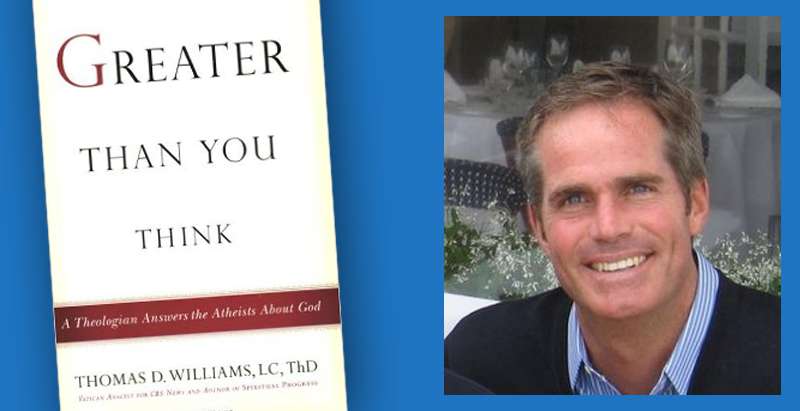I spoke with Father Thomas Williams LC about his book, Greater Than You Think. Father Williams, an American Moral Theologian, is a theology professor at the Regina ApostolorumUniversity in Rome and Consultant on Vatican affairs for CBS News. In this capacity, Father Williams covered the U.S. Papal visit of Pope Benedict XVI in April 2008 and the Pope’s trip to the Holy Land in July 2009. From 2004 to 2007 Williams worked as Faith and Religion Analyst for NBC and MSNBC News, and during this time he appeared regularly on The Today Show, NBC Nightly News, Dateline, and MSNBC’s Ethical Edge. He has also worked extensively for Sky News in Britain covering Church and ethical issues. For both NBC and Sky News, Williams covered the final illness and death of Pope John Paul II, the 2005 papal conclave and the election of Pope Benedict XVI. To learn more about Father Williams, click here.
Click here to listen to our twelve minute discussion or read the transcript below.
Gayle Trotter: This is Gayle Trotter, and today I’m speaking with Father Thomas Williams about his book, Greater Than You Think. Thank you so much for joining me, Father Thomas.
Father Thomas Williams: It’s a pleasure. It’s a good topic to be talking about these days.
GT: Can you prove the existence of God?
TW: St. Thomas Aquinas thought you could. You can certainly give evidence that a reasonable person, if you don’t have any prejudices or biases, that you will admit that there must be an intelligence behind creation, that there must be an intelligence behind all the world that we see. The real goal of my book isn’t so much to absolutely prove beyond a shadow of a doubt that God exists, but really kind of knock down the arguments that are typically used against God’s existence.
GT: And hasn’t science disproved God’s existence?
TW: Science can’t really disprove anything [about God’s existence]. You can prove something by showing it. But to say that something doesn’t exist, you can only go so far. You can say we haven’t found it yet. It is like the Russian cosmonaut is reputed to have said in the sixties when they sent their first man into space, “I didn’t see God up there.” Fine, that doesn’t mean that God doesn’t exist, the fact that you don’t see Him when you’re off in space. Right?
GT: Right.
TW: So science might say “Look, we can show you the causes for different things.” But a religious believer will always say, “But can you show me the first cause? What put everything in motion in the first place? Why there is something rather than nothing?” And science will never be able to tell us that. It goes beyond what science can show.
GT: You are speaking about faith. Some people have said that faith is a cop-out for those who can’t handle mortality. What is your opinion of that?
TW: If God doesn’t exist, if it is just a fantasy, sure. If the reason God was simply a fantasy we invented in order not to have to face reality, if it were our version of drugs or our version of whatever kind of escapism, fine. But the fact is that God does exist. So believing in God is not a cop-out. In fact, believing in God in some ways makes life more challenging, and it seems less of a cop-out because we actually have someone to give an accounting to. We know that we are going to meet our Creator one day, that we are going to have to be examined, that we are going to be judged. That’s very daunting. It seems to me more of a cop-out to say, “Ah, I don’t know if God exists. I’m going to do whatever I please.” That to me seems more like a cop-out.
GT: Do you think a person can be morally good without religion?
TW: There are morally good people, without a doubt, who don’t profess any religion. There are people who are very kind, who are very generous. But I think the question isn’t so much whether it is possible. It’s like saying when you dig a hole for a new septic tank, is it possible to dig a hole with a teaspoon. Sure. Is it feasible? Yes. Is it possible? Yes. But wouldn’t you rather do it with a backhoe? Wouldn’t you rather do it with a pick and shovel? In other words, is it absolutely possible through a superhuman effort for people to be morally good without admitting the existence of God? It is. But it is much, much easier to be good, you have a motivation to be good, you have a model of what goodness is, when you believe in God.
GT: So you think religion is a better tool for becoming a better person?
TW: I think undoubtedly it is a better tool. It doesn’t mean that every religious person is good. We know all sorts of examples, and atheists like to bring this up. They’ll say, “I know so-and-so, and so-and-so goes to church on Sundays, but so-and-so is no better than I am, or worse than I am, or cheats on his taxes” or whatever it might be. There are plenty of cases of that. But the fact is that religion gives us the wherewithal to become better if we want to. Some people say, “If I’m this bad with religion, imagine how much worse I’d be without it.” At least a religious person falls down, gets up and, especially a Christian, believes in the forgiveness of God and a second chance, and there is always a motivation there to do better.
GT: In your book, you write a little bit about the Christian view of sex. What do you think of the charge that faith encourages sexual repression?
TW: That is patently false. I think the people who say that don’t want any limitations or restrictions whatsoever on their sexual activity. The Church believes in the goodness of the human body, in the goodness of sexual relations. This is something that God created. This is not something that man made, this is something that God made. We believe it to be a holy and beautiful thing. Sure, religious people, particularly again Christians, believe that it has to be moderated, it has to be lived within a certain context of love and of commitment. There are some people who don’t want to accept that. If you look at the Bible, I think it is fascinating that when God creates Adam and Eve, the whole story in Genesis of the creation of the world and of human beings, the very first commandment He gives is, “Be fruitful and multiply.” This is something that God intends us to do. So I think it is really false and it’s unfair to say that religion encourages sexual repression. It is just the opposite.
GT: We have six children so I think we took that command to heart.
TW: [Laughs]. I think you did. I think God is not going to be able to fault you on that one.
GT: In your book, you address what some of the famous atheists claim about religion and atheists. They make the statement that atheists are more tolerant, ethical, happy, and generous. Would you agree with that assessment?
TW: The nice thing about that particular charge is that we have now enough statistical evidence to say that this is not only untrue because I say so, it is untrue because there are sociological studies that tell us. There are surveys that have been done of people first asking them their religious practice, their religious belief, and then asking them how happy they generally consider themselves to be, how happy their marriages are, their families, etc. There are studies done about a person’s religiosity and their generosity in terms of philanthropic giving to others. All these things have been studied, and religious believers come out shining compared to atheists. They give more than twice as much, just to take an example, both of their time and their money, than people who don’t believe in God or consider themselves secular, do. That’s a claim that is belied by the facts and the studies that exist.
GT: What surprised you most in writing this book?
TW: Reading through all the atheist literature can be a little bit depressing because it’s filled with anger and it’s filled with, at times — lies, honestly — things that we know are not true and very harsh claims against religion, against religious belief. The big surprise for me in reading all this was to get an insight into the heart of atheists. I think, many times, atheists are very sad and very angry people. Yes, we have to stand up to them because their ideas are harmful to others, especially the young. I think of teenagers who get infected with these ideas and fall prey to them. But at the same time, they definitely deserve our compassion and our prayers as well. Many times atheists are people who feel like they’ve been betrayed or let down by God. They are not indifferent to God. They’re actually angry at God. I think for that reason, they really do merit our prayers and our compassion.
GT: You conclude your book by encouraging the reader to examine her conscience to see if she is leading a life filled with the Holy Spirit. Did you ask this question of yourself?
TW: I ask this question of myself everyday and unfortunately, I don’t always come up roses everyday. I think it’s something that we as Christians, we have to do. We have to ask ourselves everyday. One thing is to know that right answers to questions and to be given the gift of faith. And another thing is to really be living in accordance with what we believe. And that is something that is the biggest challenge of the Christian life. It is not so much being able to recite the creed and know what we believe. That is extremely important. It is the groundwork for everything. But then, our choices have to reflect that we really believe that in practice and not just in our words. That’s where I find in my own examination of conscience that I often fall short. It is something that everyday I have to push myself on. I have to ask God to forgive me and to give me the strength to do better the next day.
GT: Does that discourage you or does that give you renewed energy for tackling the next day?
TW: It can be discouraging, but I was taught long ago that discouragement is a tool of the devil, and I really take that to heart. I think discouragement doesn’t help me. It doesn’t make God happy. I don’t think it really serves any purpose. The best thing is to humbly recognize my real failures and my real weaknesses, and know how much God loves me. He doesn’t love me because I’m a great guy. He doesn’t love me because I’ve got talents. He loves me simply because he loves me. That’s what encourages me to be better, to respond better to that love that I didn’t deserve. That for me is a source of great hope and great joy.
GT: This weekend, Pope John Paul II will be beatified, and you’re calling from Rome so you’re right in the middle of all the excitement. Would you say that his life is a good defense of the Christian faith?
TW: Pope John Paul is for sure the most amazing man I’ve ever had the privilege to meet. He was for me, wow, such an example and one of the main reasons I became a priest. Someone who had so much going for him: so talented, so great in theatre and drama — and I love theater — and a great sportsman, a skier, and a swimmer and a mountain climber, and someone so intelligent and so capable socially. And he said, “Well, I’m going to give all this to God and serve Him.” It wasn’t a last resort, I’m going to go into the seminary because I can’t do anything else. It was giving God the best of himself. For me and for many of my generation, that was incredibly moving. And to see how he lived out his life as a priest, as a bishop, and then as pope, up to the last days and his suffering was an incredible witness. And I think the good that he did was incalculable. It’s really great this weekend that we have a chance to thank him publicly, to honor him, and to thank God for giving us this great hero of the faith in our generation. We got to live at a privileged moment in history when this great man was alive.
GT: Would you say that he was a key figure in your formation as a Catholic?
TW: Absolutely. He was elected Pope when I was sixteen years old. So all my adult life, he was the Pope that I knew. I remember especially in those early years when he was so young and vigorous and traveling all over the world, he really, forgive the expression, he made it cool to be Catholic again. He made it cool to be religious. He made it something to be proud of and not to be ashamed of. He was so filled with the Holy Spirit and so much in love with Christ that he preached Him with enthusiasm. As a young person, that really motivated me. It gave me an ideal to strive after and it continues to shape my life.
GT: Is that your charge to readers of your book who are believers and looking for some spiritual succor?
TW: It is. We all need that. We all need a big push. We all need encouragement. We all need consolation. Life is tough. Today, for Catholics, I think it is particularly tough. We need a shot in the arm. We need points of light around us that give us hope. I think that John Paul II was a huge one of those. He was a shining star, and he continues to be. Now that he will be blessed, we can turn to him to his intercession, we can ask him for his help to continue guiding us. I remember I was in Rome when John Paul died and Benedict was elected. I remember just before the election, Benedict looked up to heaven, and said, “Continue to bless us, John Paul. Bless us the way you blessed us when you were our Pope here on earth. Continue to bless us from heaven.” And I’m convinced that that’s what he is doing.
GT: That’s very powerful. Thank you so much for speaking with us today, Father Thomas.
TW: It’s a great pleasure. And I’m grateful to your listeners that stuck with us, and I’m very grateful to you for this ministry of yours which is so important.
First published in First Thoughts in May 2011








